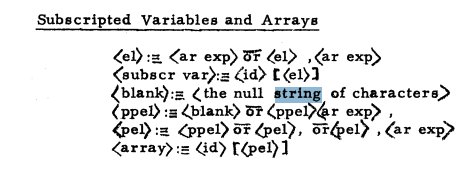Knuth frequently gives a complete definition of a word, including its etymology, derivations, derivatives, names of people who invented it, back to Babylonian times, or further, but in this case he disappoints. At least in v1 of TAOCP "Fundamental Algorithms" where "string" appears several times in the index but none of the references are to a history.
But consider the very first use of "string" (according to the index) in TAOCP, v1 3e §1.1 pg 8:
If we wish to restrict the notion of algorithm so that only elementary operations are involved,
we can place restrictions on 𝑄, 𝐼, Ω, and 𝑓, for example as follows: Let 𝐴 be a finite set of letters, and let 𝐴∗ be the set of all strings on 𝐴 (the set of all ordered sequences 𝑥1𝑥2 … 𝑥𝑛, where 𝑛 ≥ 0 and 𝑥𝑗 is in 𝐴 for 1 ≤ 𝑗 ≤ 𝑛).
The idea is to encode the states of the computation so that they are represented by strings of 𝐴∗.
The context here is that of an algorithm on sequences, finite and infinite, drawn from a finite set of letters and "a set of all strings on 𝐴 (the set of all ordered sequences ...". (emphasis is mine)
So that tells me that in his mind the word "string" comes from formal language theory, so I suspect the answer lies there. That theory uses common words as formal terms, such as "word" and "alphabet" and "sentence". The study of formal languages goes way back so it might even be the case that the word "string" comes from a translation of a word used by some investigator writing in some other language. And of course from a computer programming point-of-view, formal languages are the basis for a lot of the seminal work in parsing and compiling, and those were very early concerns in the history of programming.
(Sadly I am not a research librarian so I cannot complete this "answer" with the actual correct facts. But maybe someone else can "do a Knuth" here. But see also Carl-Fredrik Nyberg Brodda's answer that goes back to a possible different mathematical progenitor.)
I would have to say that the otherwise completely excellent and enjoyable book Jewels of Stringology: Text Algorithms (Crochemore, Rytter, 2003) disappointed me here, too. It just asserts in the Preface:
The term stringology is a popular nickname for string algorithms as well as text algorithms. Usually text and string have the same meaning. More formally, a text is a sequence of symbols.
And then it goes on from there for 280 very interesting pages covering several dozen algorithms ...
(I just mentioned that book because I love the term "stringology".)
update
Further to the idea this comes from formal language theory by way of interest in parsing and compilers, consider the paper The Syntax And Semantics Of The Proposed National Algebraic Language Of The Zurich ACM-GAMM Conference (Backus, 1959). That language being discussed of course is what became ALGOL 60.
On page 16 we see a discussion using "strings of symbols" - that is, as used in formal language theory:

And then later, pg17, we see "string" used in an informal description, in the grammar itself, of what we now call a "string":

and a few lines later as the name of a non-terminal in the very familiar usage "quoted string":

(I just love these old papers where it was the responsibility, of the department secretary, to laboriously type the paper from a manuscript making care to leave extra blank space everywhere she (inevitably, then, a "she") would have to go back later and ink in the math symbol by hand. Actually, I grew up in that era, and saw it happen in our Mathematics department at college. Those ladies were skilled. It was non-trivial to read the manuscripts of our college professors!)


